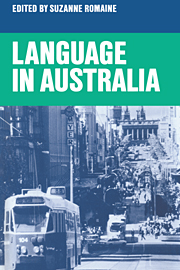Book contents
- Frontmatter
- Contents
- List of illustrations
- List of tables
- Notes on contributors
- Preface
- Acknowledgements
- Introduction
- Part I Aboriginal and Islander Languages
- Part II Pidgins and creoles
- Part III Transplanted languages other than English
- Part IV Varieties of Australian English
- Part V Public policy and social issues
- 23 National language policy and planning: migrant languages
- 24 Social class differences in the lexicon
- 25 Plain English: some sociolinguistic revelations
- References
- Index
24 - Social class differences in the lexicon
Published online by Cambridge University Press: 06 July 2010
- Frontmatter
- Contents
- List of illustrations
- List of tables
- Notes on contributors
- Preface
- Acknowledgements
- Introduction
- Part I Aboriginal and Islander Languages
- Part II Pidgins and creoles
- Part III Transplanted languages other than English
- Part IV Varieties of Australian English
- Part V Public policy and social issues
- 23 National language policy and planning: migrant languages
- 24 Social class differences in the lexicon
- 25 Plain English: some sociolinguistic revelations
- References
- Index
Summary
Introduction
In this chapter I will present evidence to show that there is little difference between secondary-school children from various social backgrounds in England and Australia in terms of access to high status and specialist lexes of the language.
The written language of Australia and its specialist oral counterpart has developed in parallel with the written language elsewhere. Turner (1966: 67), for example, writes: ‘the coincidence of English and Australian written idiom is not a natural phenomenon, but is cultivated by literature in its widest sense’. For much of Australia's history, most books and even most magazines encountered by children were written and produced in the United Kingdom. More importantly perhaps, the examples of diction found in those sources were routinely pointed to as exemplars of ‘good English’ to be adopted in schools and in later life. Increasingly too in the twentieth century, Australian English made contact with other branches of English. Ramson (1972: 44) points to the lexicon of the scientist as the greatest single influence on the vocabulary of English: ‘And it matters little whether the scientist is English, American or Australian. The specialist vocabulary of his particular branch of scientific enquiry acknowledges not regional but professional boundaries.’
- Type
- Chapter
- Information
- Language in Australia , pp. 349 - 361Publisher: Cambridge University PressPrint publication year: 1991



